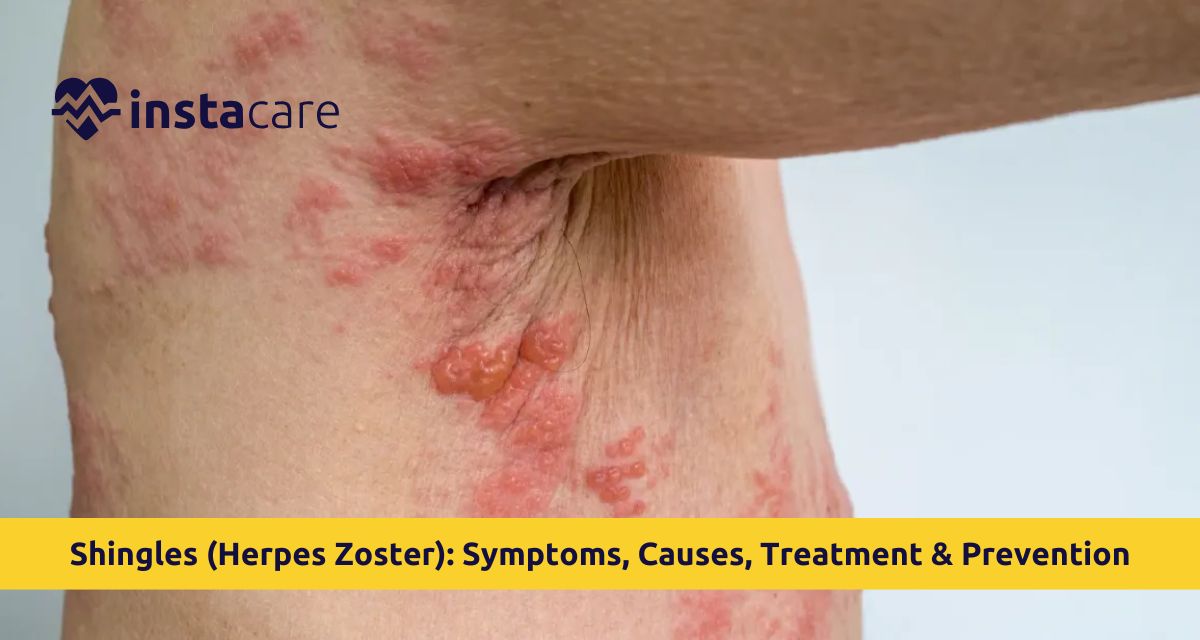Shingles or herpes zoster is an infectious viral illness that is preceded by shingles rash and pain. Shingles is an illness caused by the virus varicella-zoster that infects chickenpox. The virus gets dormant in the body after recovering from chickenpox to reemerge later in the form of shingles years later.
It is most common among older adults and those with a compromised immune system. Shingles affect about 1 in every 3 people over a lifetime. Symptoms and signs of shingles need to be diagnosed early enough that the disease be treated prior to other illness developing to complicate the disease, e.g., postherpetic neuralgia (PHN), an illness in which pain in nerves will last for many years after the rash has healed.
Let us all make the cause, symptoms, cure, and prevention step as simple as possible so that we're all in good knowledge of this so often misdiagnosed condition.
What is Shingles (Herpes Zoster)?
Herpes zoster is a virus caused by the varicella-zoster virus. Once you have chickenpox, the virus remains within nerve cells in your brain and spinal cord. Years down the line on, it revives and travels along nerves to the skin and produces shingles.
The disease typically starts as a shingles rash, red blistered fluid-filled blisters, typically in one spot on the body or face. It is not typically fatal but can be very painful and result in complications in older patients.
Other Shingles Symptoms
Shingles symptoms typically occur in an order and are different from person to person. Early signs of shingles are typically:
- Tickling, burning, or itching in an area
- Pain on the one side of the body or face
- Headache
- Fever or chills
- Not tired or uncomfortable
Progression of the Shingles Rash:
- Red rash on the skin after a few days
- Fluid blisters are formed
- Scabs over and crusts on blisters later
- Recovers within 2 to 4 weeks
- Shingles on the Face
Shingles on face, particularly around and above the eyes, is more severe. Shingles may result in blindness or loss of vision. Shingles must be seen by a physician right away with eye symptoms.
What are the Causes of Shingles?
The most significant Causes of shingles is reactivation of the varicella-zoster virus. The virus remains latent in the nerve cells of the body for many decades after chickenpox.
The reason because of which the virus is reactivated is not known, but some of them are:
- Age
- Weak immune system
- Stress
- Certain medications (such as steroids or chemotherapy)
- Illness or infection
All of them, if they had had chickenpox once, would not necessarily be ruled out of the competition, but all of them would never get shingles. Age and immunity play a huge role in its decision.
Risk Factors for Shingles
Below are some of the risk factors that make one vulnerable to acquire shingles:
Age (Over 50 Years)
Shingles in adults rises with the relative age rate proportionally. Adults over 50 years are over ten years older with greater chances of acquiring the disease.
Weakened Immune System
HIV/AIDS, cancers, and autoimmune diseases can suppress vulnerability by reducing immunity.
Chronic Stress
Chronic stress demoralizes defense by the immune system and hence might result in reactivation of a virus.
Treatment of Cancer
Chemotherapy and radiation will decrease suppression of the virus by the immune system.
Organ Transplant Recipients
Patients on immunosuppressive treatment who are organ transplant recipients are at high risk.
Early recognition of risk factors so that early diagnosis and prevention of complication can be achieved.
Diagnosis for Shingles
Doctor usually comes to the Shingles diagnosis through:
- Patient history of chickenpox
- Physical examination of shingles rash
- Character of nerve pain
Laboratory work (blood or fluid from blisters) is occasionally drawn to verify evidence of the virus under exceptional circumstances
Treatment of Shingles
Prompt Shingles treatment eliminates symptoms and prevents future risk for complications. Treatment is best achieved with:
1. Shingles Antiviral Medication
- Acyclovir, Valacyclovir, or Famciclovir
- Ideally started within 72 hours of rash onset
- Decreases duration and severity of illness
2. Pain relief of shingles
- Pain medications: ibuprofen, acetaminophen
- Secondary pain medication for nerves: pregabalin or gabapentin
- Topical creams like lidocaine
- Cool compress to calm red skin
3. Postherpatic neuralgia treatment
In case nerve pain persists for months, antidepressants, antiseizure medication, or nerve blocks are administered.
Early treatment leads to rapid recovery and prevention of the virus from spreading to eyes or immunocompromised patients.
What Is Prevention of Shingles?
Prevention with a vaccine is the solution to keep yourself as safe as possible. There are two shingles vaccines:
1. Shingrix (Recombinant Zoster Vaccine)
- New and better-recommended alternative
- 2 doses, 2 to 6 months apart
- Recommended in subjects aged 50 years or more
- Also administered in immunocompromised subjects aged 19 years or more
2. Zostavax (Live Attenuated Vaccine)
- Less utilized nowadays and older
- Single dose
- Not recommended in subjects with impaired immunity
Other Preventive Measures
- Enjoy a healthy immune system by dieting properly, exercising every day, and sleeping well
- Keep stress under control
- Avoid close contact with people who have chickenpox if you’ve never had it
While shingles itself is generally not contagious, the virus can be chickenpox to unimmunized individuals if they come into contact with infected rashes. It is treated using a dressing placed over the rash and hygiene practices.
Conclusion
Shingles (Herpes zoster) is painful but avoidable. Shingles vs. chickenpox are different. Although the virus becomes a permanent resident of your body after chickenpox, it can be domesticated by trying and getting vaccinated. Shingles and burning and pain in one area will ensure early treatment so that subsequent complications are avoided.
If you are 50 years or immunocompromised, or just not in the mood to play, risk of getting postherpetic neuralgia, have your physician talk to you about shingles vaccine. We are living in the information age, and prevention is information, therefore, knowledge is power.
Please book an appointment with the
best Dermatologist in Lahore, Karachi, Islamabad, and all major cities of Pakistan through
InstaCare, or call our helpline at 03171777509 to find the verified doctor for your disease.











